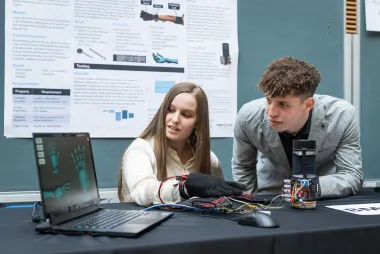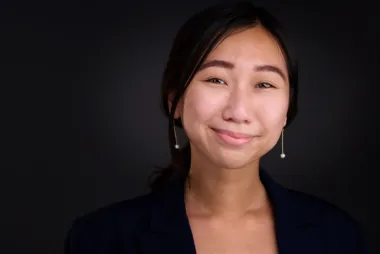“Good timber does not grow with ease. The stronger the wind, the stronger the trees.”
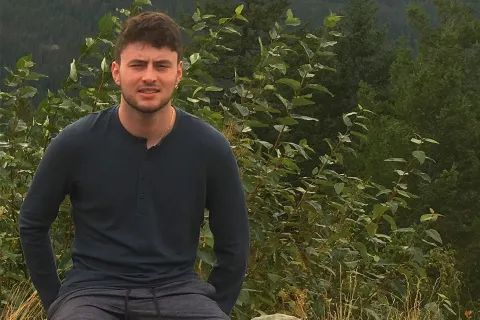
Nik Provenzano
- Degree:
- Bachelor of Applied Science
- Grad year: 2022
- Program:
- Campus: Vancouver
My name is Nik Provenzano and I was raised in Sault Ste Marie, Ontario. Ever since I was born without my left hand, I have been an ambassador within the amputee community and prosthetics industry. Despite my perceived disability, I have never allowed that to be an excuse for what I could achieve, competing against able-bodied athletes at the highest level of numerous sports growing up.
I am a Terry Fox Scholar and recent graduate of the Biomedical Engineering program at UBC, specializing in Biomechanics & Biomaterials. Last summer I interned at the Waterloo RoboHub under Dr. Katja Mombaur, Canada Excellence Research Chair in Human-Centered Robotics & Machine Intelligence. Throughout my university career, my past technical experiences include being a founding member of UBC’s first ever bionics design team, co-founding and managing Dashier – an on-demand grocery delivery start-up in my hometown established to help community members during the COVID-19 pandemic, and working as a Research Assistant at the UBC AMPEL Lab. My volunteer experiences include being a Fitness Coach for the Nubability Athletics Foundation - where I mentor limb-different children alongside other successful amputee athletes, acting as Communications Director for Sponsor a Child’s Education UBC – a student led initiative to fund the secondary education for refugee children in Africa, and serving as a board member for Lime Connect – a non-profit organization focused on promoting accessibility, inclusion, and disability awareness globally.
Why did you choose to go into your field of study at UBC?
I was extremely fortunate to be a member of the inaugural cohort of the new Biomedical Engineering program at UBC. The introduction of this new undergraduate degree was a significant reason for me ultimately choosing to study in Vancouver, as being from Ontario there were numerous alternative options much closer to home. I always knew that I wanted to enter a field that allowed me to apply engineering design principles to medicine and biology for healthcare purposes. The specialization that caught my attention was that of Biomechanics & Biomaterials, as this was the most applicable to my future career ambitions in the prosthetics industry. After comparing this opportunity with the other engineering programs that I was admitted to back in Ontario, I knew that UBC was the best option as the curriculum included traditional courses as well as hands-on studio, laboratory, and design work. These experiences over the past five years have given me a strong understanding of biology, human anatomy, and physiology, and allowed me to develop the skills required to apply this knowledge in engineering design contexts.
What has made your time at UBC memorable?
There were countless memorable moments that occurred during my experience at UBC. The first one that stands out to me is my capstone project this past year, where my team partnered with Lululemon to design a polymer-based sensor for the detection of cortisol in sweat. This project was a truly collaborative effort and our final product could not have been attained without the indispensable guidance provided by the School of Biomedical Engineering faculty & teaching assistants. To top off this rigorous 8-month journey, our team was awarded the Applied Science Faculty Award for best Biomedical Engineering capstone.
It has also been a privilege to study on such a beautiful campus and I have formed numerous lifelong friendships with individuals from all over the world. This is a true testament to how strong the international student community is at UBC, and I am forever grateful that I made the decision to move over 3,500 km from home to attend this institution. I’d also like to give a special shoutout to Dr. Newell and Dr. Harandi for having the biggest impact on my academic studies, your unwavering kindness and constant support has not gone unnoticed.
Tell us about your experience in your program. What have you learned that is most valuable?
I have learned numerous important skills during my time at UBC that will be essential in the rapidly evolving technological landscape. These technical capabilities include 3D printing, Python/Java programming, MATLAB, ROS, and SOLIDWORKS design. I also had the opportunity to polish a variety of non-technical areas through my experience with the UBC Bionics design team and Sponsor a Child’s Education. These positions gave me an amazing platform to strengthen my leadership competency, communication prowess, and collaboration ability within a professional setting. I cannot stress enough how important it is for incoming students to get involved in as many extracurriculars as possible to get the most out of your university experience.
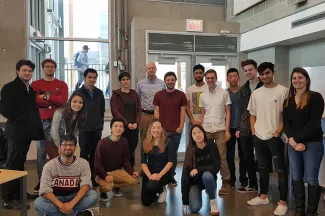
What advice would you give a student entering your degree program?
My two biggest pieces of advice for incoming UBC students is to (1) pursue as many extracurricular activities as possible and (2) utilize the strong network that exists on campus to optimally position yourself for future opportunities. The former will allow you to gain hands-on experience in a variety of technical and non-technical roles that can be translated to internships and other professional positions. The latter (i.e. networking) is the single most important intangible skill that I’ve acquired throughout the last five years and by leaving your comfort zone to capitalize on the amazingly diverse community that is UBC, you will be rewarded in future years to come. I have built numerous lifelong friendships and professional connections that have ultimately made my university experience remarkably fulfilling.
Where do you find your inspiration for using your degree to make an impact on our world?
I have always maintained a passionate fascination with bionics design, and this primarily stems from the fact that I have been exposed to prosthetic technology throughout my life. These complex devices have allowed me to accomplish everyday tasks that otherwise would have presented a significant challenge. Having the unique opportunity to be able to innovate within this deeply personal area and give back to children born just like me is what has kept me focused despite all the adversity that I have faced on this journey. Being from a small Northern Ontario town, I have had to work extra hard to get to where I am in life. In addition to the personal obstacles associated with growing up as an amputee, I was raised by two loving parents who unfortunately were unable to afford a university education, as my grandparents were all first-generation immigrants. Therefore, I was the first member of my direct family to attend university and I’ve had to navigate numerous academic challenges without their guidance as a result. The unwavering support from both my family and close friends has also been essential to fuelling my career ambitions.
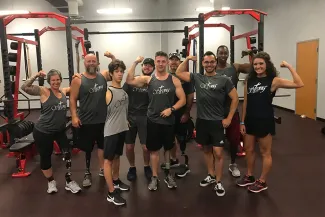
What are some contributions you would like to make when it comes to the future of work in your field?
I am a firm believer that disability is a very malleable term. This personal ideology has served as the foundation of my lifelong goal to eventually disrupt and advance the bionics industry, whether that be through leading an existing company or eventually building a start-up of my own that provides advanced, rapidly manufacturable prosthetics to amputees in impoverished communities. My long-term vision is to help remove all physical limitations on this societal minority and fundamentally reconstruct the concept of disability. In order to meet this objective, I have immersed myself deeply in both the amputee community and prosthetics industry. My experiences, as outlined above, are heavily focused on improving the lives of these individuals. There have been numerous amputees that I have idolized throughout my childhood including Terry Fox, Jim Abbott, and Hugh Herr. I feel that I have a unique opportunity to become a role model just like them, and I will know that I have accomplished my goal once all amputees are on a level playing field with their able-bodied peers. My other interest areas include programmable materials, BCI technology, accessible design, and human-centered robotics.
